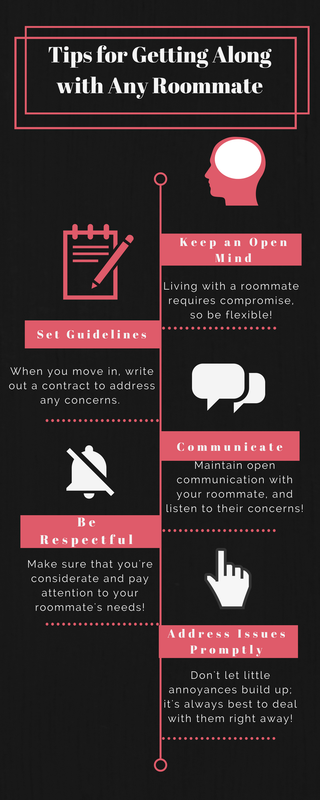How to Live with Any Kind of Roommate
For most people, starting college is a major transition. In addition to living away from home for the first time, you’ll probably also be living with a roommate for the first time. Especially if you’ve never shared a room before, it can be difficult to adjust to having a shared living space. Depending on how well you and your roommate mesh, you may end up as the best of friends, or you may decide to keep to yourselves. Either way, making sure that your living situation is a pleasant one is essential to making your college experience the best that it can be.
While your relationship with your roommate can vary based on your expectations and how well you get along, through some effort and by making use of the following tips, you can make sure that you’ll get along with any roommate.

Keep Your Expectations Open
A lot of awkwardness in roommate situations results from having different expectations for the relationship between you and your roommate. For instance, if you expect to be best friends with your roommate and consequently try to spend all of your time with them, but they’d really prefer to do their own thing, you may find that your roommate becomes even more distant if you try to force a relationship.
It’ll be far better for you to avoid having too many expectations in terms of how close you and your roommate will be before you actually meet them. It’s also important for you to keep in mind that living with someone is very different from just being friends with them; in other words, even if you’re rooming with someone you already know, your relationship may change once you start living together. Try to stay open and allow the relationship to develop naturally.
Learn About their Interests
Even if you and your roommate don’t have many interests in common, expressing a desire to know about their likes and dislikes will get you off to a great start. Sharing your favorite music, books, and TV shows is a great way to get to know each other and to bond when you and your roommate first move in.
Even if their taste differs from yours, taking the chance to understand what they’re into will make the two of you closer, and your roommate will probably appreciate the effort that you’re taking to get to know them.
Discuss Your Sleeping Schedules
Many disagreements between roommates are rooted in the fact that their sleeping schedules vary. While it can sometimes be annoying to live with someone who has a completely different sleeping schedule, it doesn’t have to become a point of contention. Try to talk to your roommate when you first move in about when you tend to wake up and go to sleep on the weekends and when you’ll each need to be waking up during the week for class.
Make sure that you make an effort to stay quiet when your roommate is sleeping, as that will make them more likely to keep the noise down for you. If you tend to be a light sleeper, you may want to try wearing earplugs at night to help you stay asleep when your roommate is up.
Discuss Your Cleaning Habits and Expectations
Another factor that can contribute to a lot of roommate tension is the differences in your cleaning habits. Though many schools try to match up students who have similar cleaning habits, the results are not always perfect. The best way to handle a roommate who likes to keep their room cleaner or messier than you do is to establish open communication to ensure that neither of you becomes frustrated with your living situation.
If you happen to be the messy roommate, make sure that you always keep the mess on your side of the room; if your stuff ends up everywhere, your roommate may feel like you don’t respect their space or their desire to keep their side of the room clean.

Make a Roommate Contract
Many dorms will have you and your roommates sit down and sign a roommate contract when you first move in. Even if you don’t have to create a contract, it’s a good idea to do it anyway. Writing up a roommate contract will help you set some ground rules and to bring up any concerns that you may have about your living situation. This is a good time to discuss potential issues, such as how much notice does your roommate want when you’re having people over, how you’re going to split groceries if you have a kitchen, and how you’re going to split up the cleaning.
Hopefully, if you have everything down in writing, both you and your roommate will be more likely to stick to the rules you draw up. If you’re worried that you won’t be able to agree on some points, it may be a good idea to bring in your RA or another third-party who can mediate the discussion. You may also find that, as you start living with your roommate, new issues come up. If this is the case, consider revisiting your roommate contract every so often to update it and to make sure that it still works for you.
Make a Bathroom Schedule
If you’ll be sharing a bathroom with your roommate, rather than having a communal bathroom, talk about when you’ll each need to get ready in the morning for class and whether you tend to shower at night or in the morning.
If you foresee any conflicts, for instance, if you both have class at the same time on certain days, try to make some sort of schedule or a plan for those mornings. You may also want to switch off when each of you uses the bathroom first, to make things even and to prevent conflict.
Communicate
Communication is essential in any relationship, and it’s especially important when you’re living with someone. If you or your roommate are afraid to voice your concerns about an issue, tension might build up and the situation will become a lot worse than it needs to be. Find a system that works for both of you; while talking in person tends to work best, if you have trouble expressing yourself verbally you can try writing notes for your roommate—as long as they can’t be perceived as passive-aggressive.
It’s best to voice any concerns that you have about living together at the beginning of the semester, so that everything is out in the open and you can both work to ensure a positive living situation for both of you, rather than waiting until problems to arise to address your differences.
Don’t Be Afraid to Use a Mediator
Conflict is common among roommates, and typically an issue can be solved through open communication. However, if you think that having a discussion with your roommate will be difficult for any reason, consider bringing in a mediator, such as an RA, to help. Just having someone else to give their input can help you think of a solution to the problem that you otherwise may not have come up with.
In addition, having a mediator will hopefully keep each of you on your best behavior, and prevent the discussion from devolving into an argument. Make sure that you find someone who is neutral between the two of you and who hasn’t been involved in the conflict, so that no one feels the discussion was unfair or biased.
Be Courteous When Having Guests Over
While some roommates are more laid back and won’t mind if you have guests over whenever, most people will at least want a heads up so they’re not caught off-guard when they get home and your friends are there. Ask your roommate what they would like you to do when you’re having friends over, and be respectful of their wishes, just as you would expect them to be of yours.
They may want you to ask beforehand if it’s okay, or they may just want you to let them know an hour ahead of time. It’s best if you both maintain the same policy for having guests over—in other words, if you want your roommate to give you a head’s up an hour before their guests come over, make sure that you do the same for them.
Keep the Noise Down
When you’re living in a shared space, it’s always a good policy to keep the noise level down when you can. For instance, while at home you might be used to listening to your music at top-volume when you’re studying, once you have a roommate it’s always better to put in your headphones.
The same goes for when you’re watching Netflix on your computer; especially if your roommate is studying in your room, using headphones so they don’t become distracted will make them feel more respected. It’s also important to keep noise down late at night and early in the morning, when your roommate is trying to sleep. Even making the effort to keep the noise down will hopefully help inspire a good roommate relationship.
Be Flexible
No matter how well you and your roommate get along or how similar you are, you’ll always have to compromise to some extent when you’re living with another person. In order to get along with your roommate throughout the semester, you’ll have to be flexible and stay open-minded.
While you shouldn’t have to deal with anything that makes you truly uncomfortable, try not to let little things bother you. For instance, if you know that your roommate is trying their best to keep the noise down when they wake up before you and are getting ready, try not to get angry if they accidentally wake you up.
Spend Time Apart
Even if you and your roommate have become good friends, it’s still a good idea to spend some time apart once in a while. If you’re spending all of your time together, you may start to get irritable with each other, and you may find yourselves getting into more arguments.
Try to find some of your own friends so you can hang out with other people when you need a break from your roommate. No matter how well you get along, you may find that when you’re living with someone and are around them all the time, you need some space and friends of your own every so often to keep your friendship with your roommate strong.
Address Problems as They Arise
When you’re living with a roommate, problems between the two of you should always be addressed as soon as they come up, to prevent them from being blown out of proportion. The longer you let problems build up, the harder it will be to solve it. In addition, if you let your concerns or annoyances stack up, you may find that your roommate feels defensive when you bring them up, and less willing to hear you out.
In addition, if you don’t let your roommate know that something is bothering you, you’ll probably become increasingly irritable and won’t handle the situation as well as you could. Both you and your roommate will be better off if you address your concerns when they first come up, rather than letting tension build up to a breaking point.
Set Guidelines for Sharing
Sharing food, cleaning supplies, and toiletries is a great way to keep expenses down, but it’s important to set some guidelines when you move in so that you’re all taking equal turns using and purchasing products.
First and foremost, you should determine what you’re all okay with sharing; make sure that you’re both okay with it, as if one of you is reluctant to share, it’s probably better that you don’t. Then come up with a way to keep track of who has bought what, to make sure that you’re both paying an equal amount for everything.
Living with a roommate isn’t always easy, and it will almost always take some effort to make it work. However, with some effort and conscientiousness on both of your parts, you and your roommate can form a great relationship that will last throughout college and beyond.

Interested in using our roommate matching formula to find the perfect college roommate for you? Create a profile & take the roommate quiz on Roomsurf! Get Started
